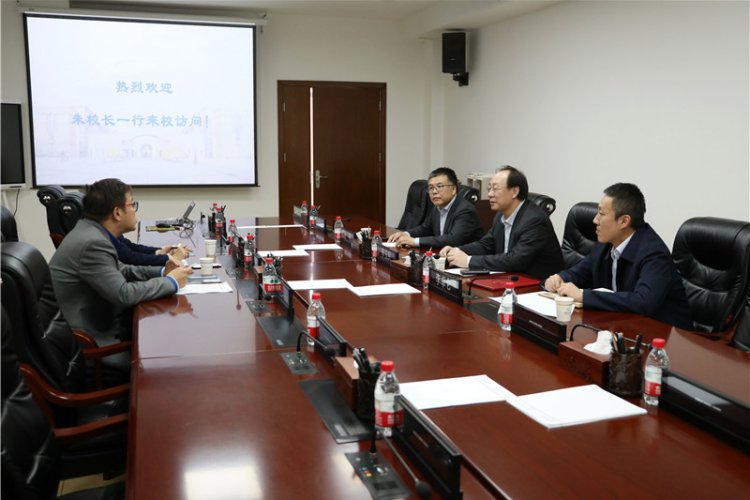
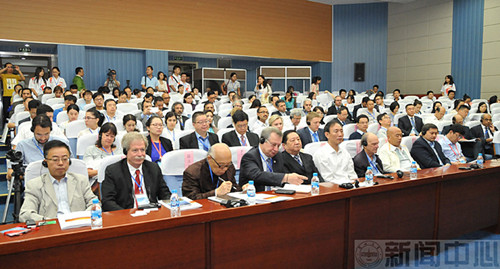
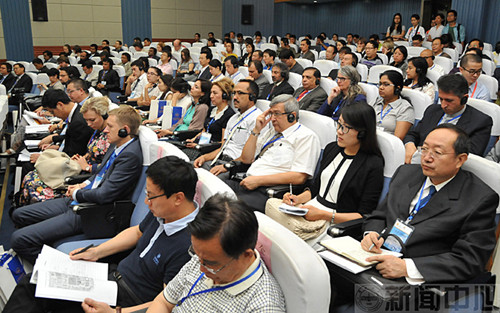
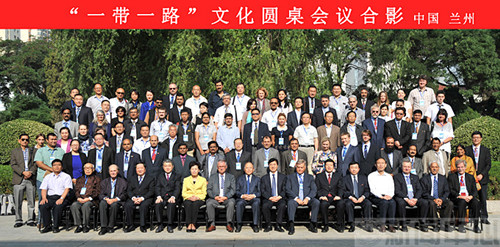
On the morning of 24th August, “One belt one road” cultural roundtable conference hosted by China Song Ching Ling Foundation and Lanzhou University opened. Nearly a hundred of experts and scholars from 21 countries including Russia, the United States, Japan, India, Thailand, Iran, Uzbekistan, Kazakhstan, Pakistan, Bangladesh, Nepal, Afghanistan, Bhutan, Turkey, the United Kingdom, Germany, France, Austria, Norway, Australia attended. They expressed their views on the way to mobilize the local organizations and colleges and universities in order to promote the exchange and cooperation among countries along the silk roads and reached common ideas towards a peaceful development, exchange, mutual learning, cooperation and win-win situation among the related countries.
Du Yubo, deputy secratary-general and deputy ministrer of the Ministry of Education of China, Li Xiaojie, deputy head of the Chinese national cultural relics bureau, Qi Mingqiu, secratary general and standing deputy chair of CSCLF, Xian Hui,standing party member of Gansu commitee and the duputy governor, Wang Hansong, party general of Lanzhou University and Wang Cheng, president of Lanzhou University attended the openning ceremony which was hosted by Mr. Wang Hansong.
Mr. Du Yubo stressed that in the construction of “one belt one road”, we need to further promote the educational exchange among countries along the silk roads, especially the high educational cooperation and exchange. This is to intensify the bridge function of high education in the human science exchange among online countries, to provide intellectuals for the construction of “one belt one road” and to accelerate mutual trust among those countries.
Mr. Qi said to built the silk roads in a new age, while operations and mutual benefit and trust play a guiding role, the nonofficial exchange and dialogue also do indispensible contribution. Standing as the belt and bridge between the government and social factors, the non-governmental organizations in the world has already become more and more important in the international affairs especially those concerned by all the people in the world. To safeguard human beings spiritual as well as civilization value, to advocate the constructive dialogue among different civilizations and to actively take part in various challenges are the commission of the nongovernmental organizations. The CSCLF hopes we could take this conference as an opportunity to build an equal nongovernmental dialogue mechanism to moderate and mobilize international social and academic institutes, NGO, medias and other folk strengths to promote equal exchange among various civilizations, to broaden people’s horizontals, to produce innovative ideas and to make contribution to solve world common difficulties.
Mrs. Xian Hui pointed out that Gansu is one of the key birthplaces of Huaxia or China civilization and agriculture civilization. It is also a main vigorous distribution corridor from the inner China to the western provinces and to the middle and western Asia. The Party committee of Gansu and Gansu government has set up the proposal of building Gansu as the golden section of Silk Road Economic Belt. She hopes Lanzhou University could optimize the discipline arrangement, expand academic perspectives, make efforts to promote the in-depth integration of production, learning and research, intensify the exchange and corporation with countries along the Silk Road and provide intellectual support for Gansu’s transformational development.
Wang Chen said in his speech that the exchange and communication on many fields such as culture and technology would definitelybe a very important prerequisite for the development of the Silk Road Economic Belt. And Lanzhou University, as a national key comprehensive university located at the important city on the Silk Road Economic Belt, has the responsibility to spare no effort on this topic: the study and research of the Silk Road culture has never been stopped. Although much effort has already been made, Lanzhou University will utilize more resource on this topic. With broader view, more chance for open cultural exchange, and more feasible research program, Lanzhou University will continue to study the Silk Road and help its development.
In the morning of 24th August, “One belt one road” cultural roundtable conference hosted by the China Song Ching Ling Foundation and Lanzhou university opened. Nearly a hundred of experts and scholars from 21 countries including Russia, the United States, Japan, India, Thailand, Iran, Uzbekistan, Kazakhstan, Pakistan, Bangladesh, Nepal, Afghanistan, Bhutan, Turkey, United Kingdom, Germany, France, Austria, Norway, Australia attended. They expressed their views on the way to mobilize the local organizations and colleges and universities in order to promote the exchange and cooperation among countries along the silk roads and reached common ideas towards a peaceful development, exchange, mutual learning, cooperation and win-win situation among the related conutries.
Du Yubo, deputy secratary-general and deputy ministrer of ministry of education of China, Li Xiaojie, deputy head of the Chinese national cultural relics bureau, Qi Mingqiu, secratary general and standing deputy chair of CSCLF, Xian Hui,standing party member of Gansu commitee and the duputy governor, Wang Hansong, party general of Lanzhou University and Wang Cheng, president of Lanzhou University attended the openning ceremony which was hosted by Mr. Wang Hansong.
Mr. Du Yubo stressed that in the construction of “one belt one road”, we need to further promote the educational exchange among countries along the silk roads, especially the high educational cooperation and exchange. This is to intensify the bridge function of high education in the human science exchange among online countries, to provide intellectuals for the construction of “one belt one road” and to accelerate mutual trust among those countries.
Mr. Qi said to built the silk roads in a new age, while operations and mutual benefit and trust play a guiding role, the nonofficial exchange and dialogue also do indispensible contribution. Standing as the belt and bridge between the government and social factors, the non-governmental organizations in the world has already become more and more important in the international affairs especially those concerned by all the people in the world. To safeguard human beings spiritual as well as civilization value, to advocate the constructive dialogue among different civilizations and to actively take part in various challenges are the commission of the nongovernmental organizations. The CSCLF hopes we could take this conference as an opportunity to build an equal nongovernmental dialogue mechanism to moderate and mobilize international social and academic institutes, NGO organizations, medias and other folk strengths to promote equal exchange among various civilizations, to broaden people’s horizontals, to produce innovative ideas and to make contribution to solve world common difficulties.
Mrs. Xian Hui pointed out that Gansu is one of the key birthplaces of Huaxia or China civilization and agriculture civilization. It is also a main energetic and distribution corridor from the inner China to the western provinces and to the middle and western Asia. The Party committee of Gansu and Gansu government has set up the proposal of building Gansu as the golden section of “silk road economic belt”. She hopes Lanzhou University could optimize the discipline arrangement, expand academic perspectives, make efforts to promote the in depth integration of production, learning and research, intensify the exchange and corporation with countries along the silk road and provide intellectual support for Gansu’s transformational development.
Wang Cheng said in his speech that the exchange and communication on many fields such as culture and technology would definitelybe a very important prerequisite for the development of the Silk Road Economic Belt. And Lanzhou University, as a national key comprehensive university located at the important city on the Silk Road Economic Belt, has the responsibility to spare no effort on this topic: the study and research of the Silk Road culture has never been stopped. Although much effort has already been made, Lanzhou University will utilize more resource on this topic. With broader view, more chance for open cultural exchange, and more feasible research program, Lanzhou University will continue to study the Silk Road and help its development.
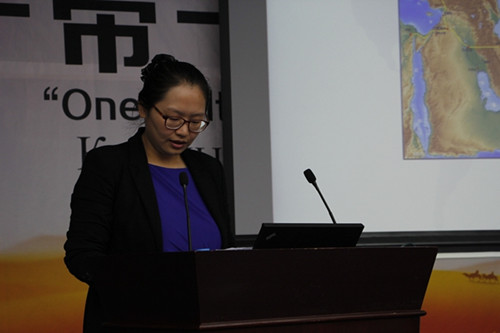
Diao Junshu
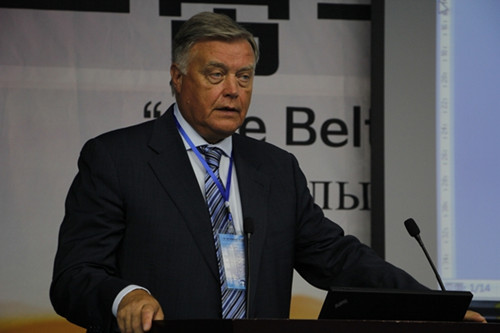
Yakunin

Zhang Liwen
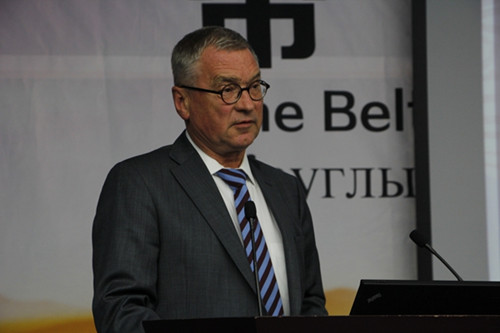
Uzbekistan Gennady Matishov
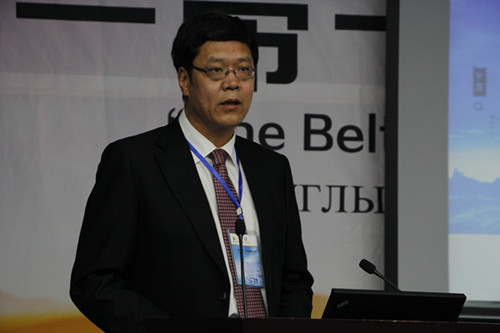
Xing Guangcheng
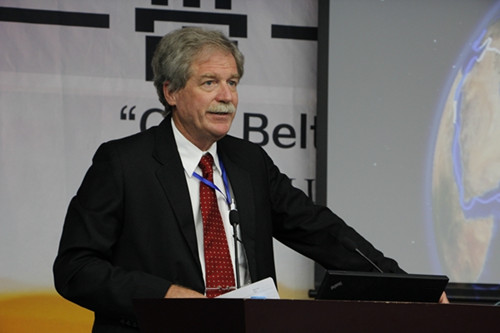
David Molden
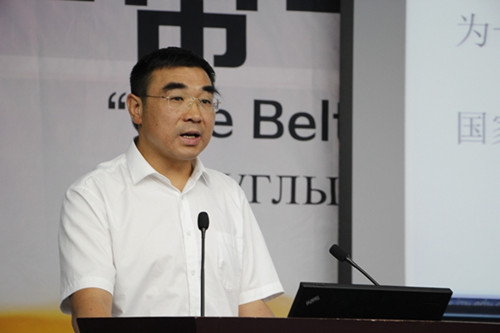
Guo Aijun
Experts and professors at home and abroad delivered keynote speeches after the opening ceremony. The historic values and practical significance are elaborated from different aspects by “background and essence of china’s ‘One Belt One Road Initiative” by Diao Junshu who is from Department of International Economy of the ministry of Foreign Affairs, ‘Economic Belt Across the Eurasian’ by Yakunin, the president of JSC Russian Railways, chairman and founder of public forum of World Civilization, ‘Harmony Power and Chinese Dream’ by professor Zhang Liwen, president of Confucius Institute of RUC Renmin University of China, ‘Climatic and Environmental Exchanges along the Silk Road ( taking southern Russia as an example) and International Eco Cooperation’ by Uzbekistan Gennady Matishov, bureau member of Russian Academy of Sciences and president of South Branch,‘digging the value of One Belt One Road’by Xing Guangcheng, the director of Chinese Frontier History and Geography Study Center of Academy of Social Sciences and the executive director of the Study Center of Shanghai Cooperation, ‘Necessity of Scientific Technologic Cooperation, College Development and Academic Exchange in ICIMOD Area by David Molden, the secretary-general of ICIMOD and ‘The Regional Disparities of Economy and Cooperative Mechanism of the Silk Road Economic Belt’ by Guo Aijun, the president of Economic Department of Lanzhou University.The experts and professors discuss the specific methods of cultural, regional and university cooperation in a practical way and analyze how to promote the Silk Road sprit of ‘Peaceful Cooperation, openness and inclusiveness, learning from each other and mutual benefit and win-win result’ in a refreshing way.
The conference that is held in Lanzhou University will last for two day. After the meetings on this morning, three symposia will be held at the same time for presentations and discussions on different topics, which are respectively cultural exchange, regional cooperation and university cooperation. Later, during the Closing Plenary Session, presentations would be made to summarize the meeting and demonstrate the achievements.




